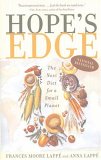Summary | Excerpt | Reviews | Readalikes | Genres & Themes | Author Bio

Critics' Opinion:
Readers' Opinion:
First Published:
Jan 2002, 400 pages
Paperback:
Apr 2003, 400 pages
Would Americans be so ready to equate a "milk moustache" with good health if they knew that most milk is now laced with a dairy-cow-growth-stimulating hormone called rBGH-which the Food and Drug Administration approved on the basis of a 90-day test on 30 rats, when the standard cancer test for a human drug is two years and several hundred rats? Would they feel safe knowing that rBGH-maker Monsanto-the company responsible for cancer-causing PCBs and the chemical defoliator used in the Vietnam War-is so worried about what the public might find out that it threatened to sue dairies who label their milk rBGH-free and warned a subsidiary of Fox News of "dire consequences" if it aired a report on rBGH risks? (The station caved and even fired the reporters.)
In the grip of this thought trap, we reduce more and more aspects of life to commodities for sale. Historically, funding for public schools has been worked out through public deliberation and carried by the public purse. Now, though, many Americans don't blink while companies, such as Coca-Cola, pay big bucks to schools for the right to exclude the sale of other beverage companies' products and gain access to our children, this despite the dramatic rise in childhood obesity and diabetes.
Previously, bushels and even shiploads of food could be owned, bought, and sold. Now, however, plant varieties and other forms of life are privately owned and turned into commodities on the market, a development the consequences of which we're only beginning to grasp. Just as we were finishing our book, two companies announced that they'd unlocked the genetic code of rice. Worried that this could lead to the patenting of the grain, an American professor responded: "How can a company own the most important food crop in the world? In Asia, rice is like a religion. To own a religion...can you do that? I don't think so."
Mistrusting ourselves-our own capacities to bring wisdom and experience to problem solving-we defer to experts who we believe are, like the market, neutral and impartial arbiters. Such deference is dangerous even in the best circumstances, but what if the experts are themselves beholden to those whose interests are not ours? The American Dietetic Association, for example, is the voice of professional dieticians, isn't it? So, we can trust its impartiality. Or can we? Fifteen percent of its budget comes from food companies, and its Web site includes "Daily Nutrition Tips," many sponsored by the same companies that make the products.31 On this site, for example, the dieticians in a "Nutrition Fact Sheet" assure us that biotech foods are safe for us and the environment. In small print we learn that Monsanto is helping to bring us these "facts." In part thanks to funding from Ajinomoto, we learn about the virtues of the flavor-enhancer MSG with no mention of the allergic reactions it triggers in some people. Or that Ajinomoto makes MSG.
And, within this thought trap's constricting hold, we don't think to ask: Which experts do we get to hear?





The Flower Sisters
by Michelle Collins Anderson
From the new Fannie Flagg of the Ozarks, a richly-woven story of family, forgiveness, and reinvention.

The House on Biscayne Bay
by Chanel Cleeton
As death stalks a gothic mansion in Miami, the lives of two women intertwine as the past and present collide.

The Funeral Cryer by Wenyan Lu
Debut novelist Wenyan Lu brings us this witty yet profound story about one woman's midlife reawakening in contemporary rural China.
Your guide toexceptional books
BookBrowse seeks out and recommends the best in contemporary fiction and nonfiction—books that not only engage and entertain but also deepen our understanding of ourselves and the world around us.